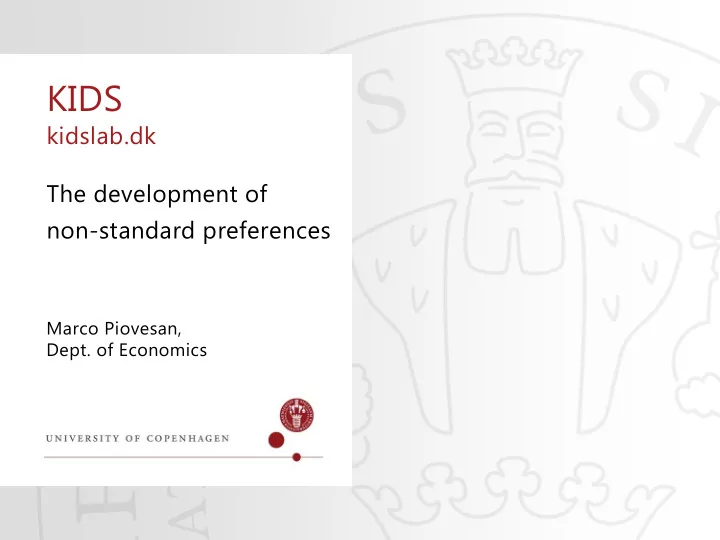

KIDS kidslab.dk The development of non-standard preferences Marco Piovesan, Dept. of Economics
10/01/2017 2 Heterogeneity of non-standard preferences Some people are generous, risk averse and patient Other people are selfish, risk loving and impatient What can explain this heterogeneity? Are these preferences an innate and specific characteristic of each human being or are they learnt through socialization? What is the role of parents? And peers?
10/01/2017 3 Our research: KIDS project • Large scale economic experiments with children and adolescents in the Copenhagen area. • Behavioral data (games) and survey of children, parents and teachers
10/01/2017 4 The Development of Preferences • Risk preferences (risky behavior and competitiveness) • Social preferences (fairness, trust, altruism and cooperativeness) • Time preferences (self-control, patience, procrastination)
10/01/2017 5 An example: why do we lie? • Women lie. Men lie, possibly more. Can we blame our parents? • We asked parents to flip two coins -each with a green and blue side- and write down the results. The combination of “green-green” earned them a 70 DKK prize. Reporting anything else was worthless. • We did not observe cheating but we compare the average winning rates to the objective probability of scoring the prize (only 0.25).
10/01/2017 6 An example: why do we lie? • We examined a few scenarios: whether or not the child was in the room and whether the child was male or female.
10/01/2017 7 Impact of our reserach • Our research will improve our understanding of preferences, their development with age and the observed heterogeneity. • Our result can help the policy maker to design programs that can foster academic achievement and propose interventions that can improve educational outcomes. • Finally we can investigate if other "environmental" factors can affect our preferences (parental leaves, health, etc.)
10/01/2017 8 Thanks! More info here: www.mpiovesan.com http://kidslab.dk A special thanks to Helene Willadsen, my main coauthor in the KIDS project
Recommend
More recommend